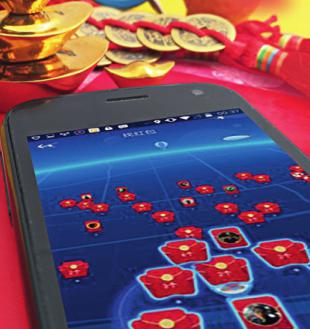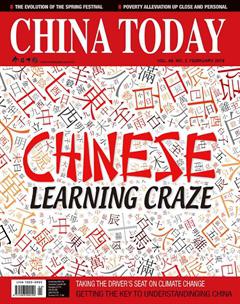The Evolution of the Spring Festival
By staff reporter HOU RUILI

THE Spring Festival, as the tra- ditional festival of the Chinese nation, is a day of reunion, a day of returning to ones roots, and a day to express familial affection. “During the Spring Festival, people reunite with friends and relatives to strengthen family and ethnic identity, and share our common memories and heritage,” said renowned scholar Hu Zhifeng.
Tradition cannot be wiped out, but with the development of the times, new Spring Festival customs have emerged, adding new color to the ancient festival.
New Tastes of Reunion Dinners
Reunion is the most important theme of the festival. Family members reunite on the lunar New Years Eve to get rid of the burdens and concerns of the past year and usher in the new one with high hopes.
Writer Ge Liang recalled the scene of the Spring Festival when he was a child. New Years Eve dinner usually was eaten at the home of the elder relatives. The women were busy in the kitchen preparing a rich dinner. Men with good calligraphy wrote New Year scrolls, and reveled in the praises of the people around. Children said auspicious words to and received red envelopes with lucky money from happy grandparents. It can be said that at that time, the festival was centered around a variety of rituals. In these rituals, the Chinese peoples solemn warmth and reverence towards tradition was evident.
This tradition has been preserved to this day. It is not surprising that the Spring Festival homecoming has become the largest annual migration in the world.
In the 1970s and 1980s, dinner was mostly homemade. At that time, the lack of resources led to the couponbased, rationed supply of food like meat and fish. For this relatively rich dinner, people often began setting aside various kinds of tickets a few months in advance.
In the 1990s, with the improvement of living standards, for the New Year, people chose to go to restaurants to have dinner and save a lot of housework. Sometimes, it was hard to find a table in even expensive restaurant due to the high number of diners.
Over the past five years, the lunar New Years Eve dinner has acquired new tastes. Ordering food and take-out have become a convenient option. New forms such as on-site service and private custom-made dinners are gradually gaining popularity among the young generation. Some restaurants have also introduced cooked food packages and semi-prepared products. Abundant quantities of fish and meat are no longer favored, as healthy and green dining concepts are becoming increasingly popular.
As more people returned from traveling abroad, they began to add a foreign taste to the New Years Eve dinner. While Zhang Li was traveling in Hokkaido, Japan, he learned the practice of Sukiyaki. After he returned, he showed his skills during the Spring Festival. The whole family sat around the table and looked at him with surprise. “This dish is healthy and delicious, we should learn how to make it!” The family accepted the improvement and innovation of the family reunion dinner.
More Blessing Forms
The Chinese New Year is also the time to relinquish the old and welcome the new. Celebrating the Spring Festival means welcoming new arrivals through worship, staying-up late with loved ones, and lighting firecrackers.
In the impression of Li Fengqun, a writer living in the United States, having the Spring Festival means all disturbances can be put aside; children fall asleep in spite of the sound of firecrackers with gifted money laying besides the pillow. It is a ritualistic time, to unwind and start afresh.
To this end, people always keep the custom of pasting spring couplets on the door, writing the character for “fortune” and passing on blessings. However, with the moden developments of science and technology, the custom of giving New Years greetings has gradually evolved from a face-to-face kowtow and bow to showing greetings via WeChat. During the last Spring Festival, the AR fortune scanning by Alipay was prevalent in more than 2,300 cities around the world, as reported by the U.S. media network Discovery.
The way to give money has also changed from face-to-face delivery from the old to the young to the whole fam- ily sharing red packets online, making this happiest of moments in the reunion a digital experience. Even Zhang Lis father-in-law, who is in his 80s, was also holding up a mobile phone to participate in it. Every time he gets a big red envelope, the old man is happy.
During the Spring Festival last year, Alipay launched the Ant Forest Planting Trees Together project, and 15.53 million families planted 52.12 million trees. Whenever a family completes the planting, Alipay will plant a real tree in the desert. This act of digitally powered public benefit in the real world brings together the love of individual families.
Enjoying the Festival
Whether it is a family reunion after a period of long separation, or a friendly meeting, food and gifts are a must. Time-honored brands are the common choice of the Chinese people. However, with the improvement of consumption levels, peoples choices are also changing.
In the 1980s, a few pounds of good meat and a few new clothes were the best special purchases for the Spring Festival for ordinary people. In the 1990s, in addition to food and drink, consumer electronics became popular. Then after entering the new century, the living standard improved, and people began to pay more attention to health and nutrition. Health care products were once ranked the first choice as New Year gifts. Nowadays, trendy consumer electronics such as smart phones, tablet computers, and smart watches have become the new favorites for young people. Smart household supplies have become a hotspot for elders to help reduce housework.
In recent years, online shopping has seen a meteoric rise. Globalization has enriched the amount of choices at the family table for the Spring Festival. Chilean king crab and Boston lobster are all placed on the tables of Chinese families. According to Tmalls statistics, the turnover of imported fresh products during the last Spring Festival increased by nearly 300 percent year-on-year.
Visiting the temple fair is another traditional activity of the Spring Festival to enhance family ties and friendship.
In the late 1970s and early 1980s, temple fairs evolved from ancestor worship to folk fairs. After the 1990s, the temple fair became more and more commercial. There were also exotic songs, dances, and intricate forms of entertainment, but traditional folklore still dominated. At the temple fair, people wear traditional handicrafts, taste local snacks, watch various folk performances, and speak in different dialects. The temple fair is filled with a strong local flavor and festive joy. According to data from damai.cn, last years tickets for the temple fair in Beijing Temple of Earth were sold out in just two seconds.
As Chinese culture is increasingly recognized by all countries. Chinese Spring Festival folk performances are also shining in Chinatowns and other major cities in various countries. In the last Spring Festival, the Smithsonian American Art Museum hosted the “Chinese New Year Family Day” event, and the lion dance performance won the audiences applause. The “Happy Spring Festival” temple fair in Nottingham, the United Kingdom, ushered in many local people.
In addition to traditional entertainment such as special purchases and visiting temple fairs, watching films has become a dazzling star in the Spring Festival entertainment in the recent decade.
With the commercialization of Chinese films, the box office in Spring Festival witnessed a sharp increase. Kung Fu Dunk and CJ7 in 2008 broke RMB 100 million for the first time. The box office of Avatar during 2010 Spring Festival was over RMB 100 million. But before 2012, there were few films tailored specifically for the Spring Festival. In 2013, the custom-made Chinese New Year films Journey to the West and The Mermaid brought people a new joy of the Chinese New Year. From then on, the New Year movie season became the most profitable period. From 2008 to 2017, the season has repeatedly created miracles, the number of viewers increasing 20 times.
In the 2018 Spring Festival, five films of different styles were released, such as Shadow and Operation Red Sea, catering to the different tastes of viewers. From the first day to the sixth day of the first lunar month, box office earning reached RMB 5.7 billion, nearly doubling the amount of RMB 3.3 billion in the same period of the previous year.
Happy Traveling
With convenient transportation and well-developed communication networks, many elderly people live longterm in their childrens homes to look after their grandchildren, making reunion easier to achieve. Busy work and study schedules make the holiday even more precious. The seven-day holiday of the Spring Festival is the longest holiday of the year, so many people choose to travel during the festival.
Sun Linfeis family is a good example. Usually, the parents are busy with work, while children have heavy school work, and it is rare to have a holiday together. So the family chose to travel during the Spring Festival. “We visited Shanghai in 2017. I made the arrangements as relaxing as possible to better experience the taste of southern China,” said Sun. From 2000 to 2017, the compound annual growth of holiday travel and tourism income in the Spring Festival was 15 percent and 21 percent respectively. In the Spring Festival of 2018, the number of travels reached 386 million, a yearon-year increase of 12.1 percent, and the tourist income was RMB 475 billion, a year-on-year increase of 12.6 percent.
Outbound travel has also grown rapidly. Zhou Ying, a media worker in Zhuhai, Guangdong Province, brought her family of six to Fiji in the South Pacific during the 2018 Spring Festival. “Here we saw the Spring Festival elements of the Year of the Dog, but the atmosphere was quiet. On the Chinese New Years Eve, we booked a barbecue dinner by the sea. Our two young daughters made friends with local children at the seaside,” said Zhou. Last Chinese New Year, Chinese tourists from nearly 200 major domestic cities visited 68 countries and regions. Southeast Asia is still the destination for most outbound tourists during the Spring Festival, and long-distance destinations like Argentina and Mexico are also popular. The number of young adults accounted for nearly 50 percent of the total.
In order to attract Chinese tourists, during the 2018 Spring Festival, some major shopping malls in the U.K. were decorated with Chinese New Year decorations. In front of the Sydney Opera House in Australia, a 10-meter-high giant zodiac dog lantern was set up for visitors to take a photo. In the supermarkets, shopping malls, and many other places, the Chinese character“fortune” was hung. Frances Marseille developed the Chinese version of the local metro APP, and opened the“Provence Impression” WeChat official account, regularly updated to introduce Chinese tourists to the regions cultural activities.
Chinese tourists not only bring tourism income to the local area, but also promote the integration of the Spring Festival elements with the local customs.
Chinese New Year features many traditional customs, however, many of them are no longer there. When traditional festival customs gradually fade away with lifestyle changes, some people say that the taste of Spring Festival is somewhat diffused; when technology and wealth add new flavor to the festival, some people say that the taste is stronger. What do you think?

